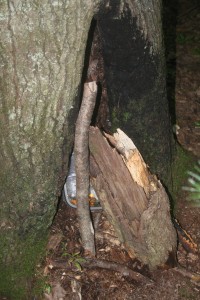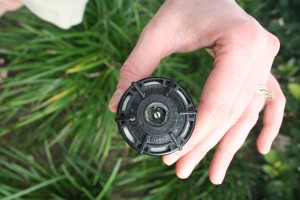From Innovations, a website published by Ziff-Davis Enterprise from mid-2006 to mid-2009. Reprinted by permission.
The start of a week-long vacation has me in a somewhat festive mood today, so I thought I’d tell you about a new hobby I’ve been pursuing recently that’s also given me new insight into capacity of IT to transform lives.
About two years ago, my wife and I took up geocaching. It’s a global game that was enabled by the Clinton administration’s 2000 decision to open up the government’s network of global positioning satellites (GPS) to civilian use. Geocaching is basically a worldwide treasure hunt. Players use handheld GPS receivers to find containers placed by other enthusiasts in locations ranging from city street corners to remove mountaintops.
 |
| A classic cache hide in the base of a tree. |
In its simplest form, players provide each other with nothing more than the GPS coordinates for the treasures, which are typically containers filled with trinkets. Geocaches can be as small as a pencil eraser or as large as a suitcase. When players locate one, they note their visit in a log book that’s kept in the container and also post their “find” on the geocaching.com website.
Global Craze
Geocaching has exploded in popularity. In January, 2005, there were about 141,000 geocaches hidden in the world. Today, there are more than 640,000, and a half million “finds” are logged each week. There are geocaches all around you. Nearly 1,000 have been placed within a 10-mile radius of Dallas-Fort Worth airport alone. My wife and I were so taken with this phenomenon that we started to write a book about it – Geocaching Secrets – that will be published in the spring.
One thing that’s captivated us about geocaching is transformative effect it has on the hobbyists who pursue it. We’ve spoken to several people who have logged more than 20,000 finds over the last eight years, or nearly 10 per day. Two years ago, one team spent months planning an attempt to find the most caches in a single day. They finished with over 300.
People report that geocaching has brought their families together, introduced them to dozens of new friends and led them to destinations that they never would have visited. One enthusiast credits the game with helping him shed 150 pounds and giving up smoking by using various vaporizers of all kinds. Several have said it saved their marriages. One disabled war veteran told me geocaching gavee him a reason to live at a time when he was seriously contemplating suicide.
It’s also brought people outdoors and introduced them to new worlds they never knew. In seeking caches within my local area, I’ve visited dozens of parks, nature preserves and cityscapes that I never knew existed. One recent excursion took my family on a discovery tour through the streets of lower Manhattan, with each stop relating to a different Revolutionary War event.
Platform for Innovation
 |
| Container hidden as a sprinkler head |
I’ve been struck by the innovative spirit that this relatively simple idea has unleashed. The people who hide geocaches (some have stashed well over 1,000) come up with devilishly difficult tactics to disguise their treasures. One person specializes in hiding tiny containers inside of animal bones. Another constructs containers out of hollowed-out logs. Many others specialize in scrambling the geo-coordinates in elaborate puzzles and ciphers. One recent search directed my wife and me to watch a movie for a reference to obscure letters written by Benjamin Franklin. We then had to apply a cipher to the writings to zero in on individual words, the first letters of which spelled out the clue. That’s just the tip of the iceberg. Some cache owners devise riddles that would tax the skills of a mathematics Ph.D.
Educators use geocaching to teach their students about geology, mathematics and creative thinking. The Arkansas Parks Service stashed a cache in each of the state’s 52 parks this year in an effort to lure citizens into the outdoors. Hundreds of finds were reported in just the first two weeks.
Like the Internet, the geocaching community is entirely self-guided. There are no governing bodies and no formal leadership. The rules of the game are determined by the consensus of the players in a process that’s loosely democratic but without votes. Bad behavior is regulated by peer pressure. People do the right thing in order to preserve the simple beauty of the game.
Geocaching is just one example of how technology unleashes creativity that changes people’s lives. It’s also a testament to how big ideas emerge when people are given tools and freedom to discard assumptions and invent new possibilities.
